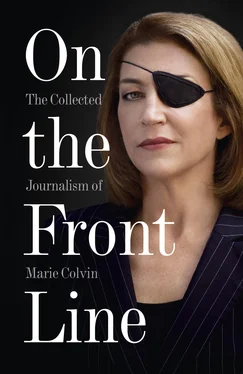I rose at 5am to the incongruous sounds of a cock crowing and another barrage of anti-aircraft fire, this time a light and sparkling scattering of shots of tracer into the air. The government newspaper headline read: ‘Hussein rockets answer the call of Palestine. The road to Jerusalem is open.’ Uniting under attack behind Saddam, people might even believe this hyperbole.
Downstairs the taxi drivers demanded the exorbitant sum of $3,000 a car to the Jordanian border, because a convoy of cars that had left on Saturday had been bombed near the town of Rutba in the western desert.
We drove out of Baghdad on the deserted highway, past military camps on the city’s perimeter that appeared surprisingly intact, with anti-aircraft guns still manned on mounds along their boundaries. Government army lorries trundled south towing anti-aircraft guns, but there was little other traffic. The journey through flat, unbroken rocky desert was uneventful. Iraqi guards stamped exit visas into our passports at the desolate border station of Trebeil. Among the shabby breeze-block buildings we left behind the stacks of abandoned cheap luggage from earlier refugees and drove across the no man’s land into Jordan.

Ghosts of war stalk Basra’s empty streets
SOUTHERN IRAQ
23 August 1992
The fat singer in the smoky gloom of the Eastern Nights Club in Basra was just getting into her stride when the lights went up. The laughter at a table of rich merchants died instantly.
An unsmiling officer in khaki swept through the beads hanging across the door followed by eight soldiers, who fanned out between tables draped in red velvet and dotted with bottles of Scotch. The customers froze. They knew that last month Saddam Hussein executed 42 merchants for profiteering.
The officer scanned the room, but he had no interest in the traders or the soldier sitting with a buxom prostitute. His eyes fell on a table of eight young men.
Two soldiers moved forward, ordering the men to their feet with the flick of a Kalashnikov. The officer pulled out battered papers. The first passed and was motioned to sit; the second was led away.
‘Oh, he didn’t even have time to change his clothes,’ lamented Ishar, a young prostitute. A second glance told the story: the arrested man still wore his olive army trousers under a white shirt and maroon jacket. He was a deserter. Four more of his companions were led away.
As the soldiers left, there was a moment of silence. Then the manager strode to the dance floor and, with a grandiose flourish, restarted the band and the singer. The lights dimmed and laughter flooded the room again – the forced laughter of relief.
Basra, capital of the south and home to Iraq’s Shi’ite majority, is a city under siege. Whereas Baghdad has been largely rebuilt since the Gulf War, Basra still bears the scars of allied bombing and the rebellion that saw officials of the ruling Ba’ath party slaughtered in the streets and government buildings and hospitals looted and torched.
Today, fear of Iranian infiltrators, army deserters and fugitive rebels empties the city’s streets after 9pm. Food is scarce and expensive. The factories, port and oil plants are closed; its hospitals desperately short of medicine and filled with malnourished babies.
Fifty life-sized statues of dead heroes of the Iran–Iraq war line the corniche on the Shatt al-Arab, their arms pointing across the water towards the old Iranian foe. Locals, fearful of the enemy within, joke that they should point in every direction.
The man charged with keeping order in Basra is Brigadier General Latif Omoud, a governor who sits behind a desk with 10 telephones. It is impressive, but unconvincing.
The city’s telecommunications have not been restored since the end of the Gulf War 18 months ago, and a line has to be installed to each number he wants to call. ‘The pink telephone is for my girlfriend,’ he joked.
Dressed in a neatly pressed uniform and with his hands manicured, Omoud appears unbowed by the calamitous state of the city he took over after Iraqi forces crushed the Shi’ite rebellion in March last year.
He has not been amused, however, by the news that Britain, France and the United States were preparing to enforce an air exclusion zone south of the 32nd parallel to protect the Shi’ites in the southern marshlands from destruction by Saddam.
Any Iraqi plane or helicopter that flies will risk being shot down. Since Basra is 100 miles south of the 32nd parallel, Omoud was angry and perplexed. The general, who sees himself on the front line with Iran, claims to have quelled the ‘security problem’ in Basra.
But the road south from al-Amarah to Basra remains a no-go zone at night; checkpoints are attacked, soldiers killed and civilians robbed. It will get much worse, said Omoud, if the allied plan is enforced.
‘We have arrested many infiltrators in Basra,’ he said. ‘They come from Iran to commit acts of sabotage. We should be allowed to fly our planes and helicopters to counter the Iranian menace.’
He made no apology for the attacks on the marshes, insisting they were a haven for rebels and Iranian agents. The West, Omoud said, was short-sighted: ‘The Iranians are still interested in exporting their revolution.’
Then the governor was off, speeding away in his armoured white Mercedes followed by a jeep with a mounted machinegun and two cars full of soldiers. Behind him, sweltering in the 53°C heat, bricklayers continued rebuilding his governor’s garrison, which had been gutted during the rebellion.
The real picture in the south is difficult to piece together in a tightly controlled nation of nervous people. But it is clear that the government has won the upper hand in the war with the 30,000 rebels in the Hawaiza marshes, a 6,000-square-mile swampland of waterways and reed banks.
The attacks against insurgents in the marshes, according to diplomats in Baghdad and interviews in Basra and al-Amarah, began around 21 July. There is little doubt they were brutal. Diplomats believe that Iraq used helicopter gunships and artillery against the marsh Arabs but has not sent in ground troops because of the treacherous terrain.
The rebels had little chance. Besieged, they were killed or forced to flee or surrender. Many civilian marsh dwellers also died. The season favoured the army; in July and August the marshes dry up, making operations easier. One source said 9,000 rebels had surrendered or been captured.
The few townspeople in al-Amarah willing to talk say the roads are too dangerous to travel at night. At the Saddam Hussein general hospital, Dr Ayad Abdul Aziz said there had been constant attacks on civilians and soldiers in the area near the marshes.
But operations by the Iraqi army seem to have ended. The military appears to be in defensive positions. Nightly on Iraqi national television, captured rebels make their confessions.
One Iraqi, a PoW from the Iraq–Iran war, claimed he had been forced to fight for Iran: ‘It was decided to start a sabotage campaign. I received verbal instructions to go on a fact-finding mission in Iraq. We needed information on the security status. I carried false identification, money and a pistol.’
He said he met rebels who had plentiful supplies of explosives and weapons, and sent back information to Iran. The interviewees show extraordinary calm while making their confessions; it is widely assumed they are executed afterwards.
‘Of course they are calm,’ said one Iraqi viewer last week. ‘They know it is the end of their lives.’

Читать дальше













